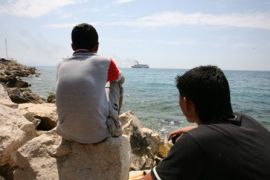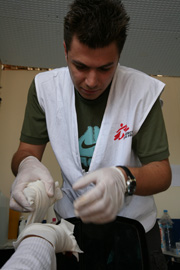Afghan refugees despair in Greece
With no legal recourse, desperate illegal immigrants fear forced repatriation.

 |
| Fearing for his life, this Afghan man fled for Greece and has now lived for more than nine months in Patras, hoping to make his way to Italy and the west [Hawaleshka] |
Sitting amid the squalor of a sprawling shantytown in the western Greek port city of Patras, a sombre illegal migrant named Hanan explains why living in Afghanistan left him facing a potentially deadly Catch-22 situation.
“If I work with the Americans, [the] Taliban want to kill me … but if I work with [the] Taliban, Americans want to kill me,” the 28-year-old told Al Jazeera as he sat seated cross-legged in one of the camp’s dingy huts.
“What can we do? This is our life.”
And so Hanan fled Afghanistan in search of work and security in Europe.
For more than a decade the Patras shantytown has been home to countless desperate refugees like Hanan. From this city in the north-western Peloponnese they hope to stow away on one of the many commercial transport trucks that daily board ferries bound for Italy with the promises of eventual passage further westward into the European Union.
Wakil, a 14-year-old boy who is also seeking passage into Europe, arrived in the Patras camp three weeks ago.
Of Afghanistan’s 26 million inhabitants, more than 50 per cent are under the age of 18. It is not surprising then to find so many boys in the Patras camp.
“My money is finished,” he says in rudimentary English. “And in this country, the police not help me.”
Italy is next on his treacherous trek, which has taken him from Afghanistan to Pakistan, and on to Iran, Turkey and now Greece. He says he eventually wants to go to Finland, though he has only 20 Euros left.
Dire conditions
 |
| Close confines around Patras have led to tensions with residents [Hawaleshka] |
After more than a decade of squatters, there is a strangely suburban uniformity to all the huts in the shantytown.
They all appear to be made of corrugated tin sheeting and cardboard wrapped in heavy gauge plastic, held together with string and rope.
Most measure roughly two metres wide by four metres long and sleep six to eight people. There are no beds.
Kinked electrical wires strung haphazardly throughout the camp and inside the huts distribute electricity pirated from the surrounding buildings.
Several of the shacks sport satellite dishes or TV aerials.
The makeshift communal shower stall is big enough for eight or so people. The water, also stolen, gurgles from a green garden hose.
Squatters say the police sometimes disconnect the water and electricity.
In one corner of the camp stands a single row of three latrines. Dug out of the hard sun-baked earth, they are the only toilets on site for the hundreds of boys and men.
At first it was the Kurds who squatted on this privately-owned land near the coastline of the Ionian Sea, a short walk north of the city’s bustling harbour.
But in the past year the camp has attracted Palestinians, Iraqis and now Afghans.
Today, between 500 and 800 illegal migrants, almost exclusively Afghans, live here.
An unsettling high percentage of them are children. Many are unaccompanied and present easy prey to elements of organised crime involved in human smuggling. Sexual abuse has been reported.
Resentment builds
But the Greek government ignores or is incapable of meeting the refugees’ basic needs. Police, who so far have resisted entering the camp, round up migrants for deportation if they are found outside.
Local residents in the apartment buildings that crowd the shantytown’s perimeter resent the migrants’ presence and the inevitable filth resulting from so many people living in cramped and inadequate conditions.
That leaves community groups and aid agencies like the Red Cross and Doctors Without Borders to fill in the substantial gaps.
“It is inhuman to leave these people to live here like this,” says Christos Karapiperis, a social worker with the Hellenic Red Cross.
“It’s awful.”
The Greek office of Doctors Without Borders recently opened a clinic inside the camp. But Dr. Apostolos Veizis, the group’s programme director, says conditions here remain “unacceptable, inhuman and do not meet international standards”.
People like Karapiperis want a government-sanctioned facility established for minors and another for adult asylum seekers.
“We are sure that organised crime is controlling the whole thing,” Karapiperis says, referring to human smuggling.
“The refugees are afraid to talk about this — they are afraid for their lives and maybe their families’ lives.”
Protecting refugee minors
Panagiotis Papadimitriou, an Athens-based lawyer with the Greek Council for Refugees, worries not enough is being done to protect the children.
“There have been reports of sexual abuse and sexual exploitation of people underage,” Papadimitriou says.
Many of the refugees never bother applying for asylum.
“Most people know that if they apply for asylum in Greece, there is a big, big chance of being returned,” Papadimitriou says.
Greece’s daily newspaper Kathimerini has reported that out of 20,692 asylum applications submitted in 2007, Greek authorities approved eight.
On appeal, however, another 132 were approved. The approved asylum applications mark less than 0.7 per cent of the total number who applied.
Detentions, expulsions
 |
| Sunbathers near the shantytown seem oblivious to the illegal immigration |
In June, the EU Parliament passed legislation aimed at expelling illegal migrants.
Under the rule changes, authorities can hold suspect migrants for up to 18 months before expelling them.
If the migrant refuses to cooperate or is considered a threat, he or she may be banned from re-entering the EU for up to five years.
The move signals a concerted effort by the bloc to bring uniformity to an expulsion process that until now had varied widely among member states. In some cases, countries could detain migrants for no more than about a month, but in several others they could be held indefinitely.
Aid groups decried the changes as overly harsh.
Officials estimate there may be as many as eight million illegal migrants in the bloc. And while exact numbers are hard to come by, the EU estimates the number of illegals increases by between 350,000 and 500,000 per year.
Many pick Greece as their point of entry, according to Frontex, the EU agency that coordinates border security with member states.
Particularly porous is the land-sea border that Greece’s eastern islands share with the Turkish mainland. In its 2007 annual report, Frontex said Greece had reported apprehending 9,300 illegal migrants crossing its border at sea, a sharp increase of 170 per cent over the previous year. Many more, however, got through.
“The situation at the southern maritime borders,” the report noted, “remains a source of serious concern.”
Human compassion
 |
| Dr. Afeidis dresses the stitched wound of an Afghan boy |
In the meantime, the clinic opened by Doctors Without Borders at the Patras shantytown sees between 15 and 20 patients a day, says Dr. Giorgos Afeidis, who volunteers his time there.
Typical cases include skin infections such as scabies exacerbated by the close quarters and unhygienic conditions, respiratory infections like pneumonia, and injuries sustained in attempted escapes via the port.
Recently, Afeidis saw a teenage boy enter the clinic, his right hand wrapped like a mummy’s in white gauze. The boy, in his mid-teens, needed his bandage changed.
Afeidis removed the dressing gingerly, exposing a grisly gash about six-centimetres long, stitched together like a torn shirt.
The boy says police spotted him as he tried to stow away under a transport truck. In a panic, he scampered out from under the rig, but in his haste cut himself badly on a piece of sharp metal.
Injuries like these are often beyond what the doctors at the modestly equipped clinic can handle, so they will take the more severe cases to a local hospital where Greek physicians often treat the patients for free even though under their rules they are required to charge them.
“It is human compassion,” Afeidis says. “You cannot leave someone and not help them because they cannot pay.”
Threats and risks
In February, Italian authorities boarded a ferry that had sailed from Patras and discovered a 15-year-old boy who reportedly had died of exhaust fumes while hiding under a truck.
In June, Greek media reported that nine migrants who had hidden in a refrigerated truck aboard a ferry had to be hospitalised with hypothermia. Two were found unconscious.
The Red Cross’ Karapiperis says toward the end of June a man in his 30s was overcome by heat and dehydration and died after hiding beside a passenger ferry’s engine. Two other men collapsed, but survived.
“He had entered the ferry under a truck, and then hid by the engine,” Karapiperis says. “They had no water to drink.”
Nikolaos, a 36-year-old general manager at a bank who declined to give his surname, has for 10 years lived in one of the many apartment buildings that border the camp.
“I want to ask how they live without money?” says Nikolaos. “They have to steal.”
He says that when Albanians (often viewed by Greeks with suspicion) immigrate to Greece, they are at least willing to work.
“The bad thing is, these people [the Afghans] don’t want to work.”
From inside the camp, Mohammed, 32, begs to differ.
“I cannot go here,” he says, sweeping his arm to indicate the city. “No work!”
Outside the camp, Wakil the 14-year-old boy with no money left, asked a visitor for help.
“My father is dead,” Wakil told the visitor.
“Taliban is firing,” he adds, miming with his hands the shooting from the hip of an automatic assault rifle like an AK-47.